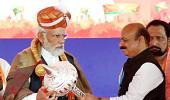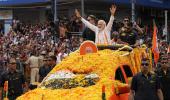Given that the BJP made all these moves and that these moves were presumably approved by Modi if not directed by him, who should accept the responsibility for the party's rout? asks Aakar Patel.

There are questions that must be asked of the Opposition, and I am sure others will ask them.
It is the party that governs the state and the Centre that is accountable and so these questions must be asked of it and the man leading us.
An election is over in which the prime minister said that a ban on the Bajrang Dal was the same as an attack on Hanuman.
One headline read: 'First they locked up Ram, now Hanuman...', says Modi after Congress pitches Bajrang Dal ban in poll manifesto.
And then he said that the Congress was trying to get Karnataka to separate from India.
The headline in the Indian Express was 'Congress Shahi Parivar calling for Karnataka secession, inciting foreign powers: PM Modi'.
Now that the elections are over and the Congress has won, will the Centre act on the prime minister's belief?
That is the first thing we have to think about.
How many voters believed that the Congress was asking for secession and voted they way they did for that reason?
Did the prime minister himself believe his words or was he saying them to instil fear in voters?
If the latter, is that what prime ministers should be doing?
Perhaps the answer to that is yes, that in a democracy all is fair when it comes to electioneering and a little untruthfulness and allegation are fine.
And perhaps the answer is no. That the prime minister must act responsibly.
And perhaps the answer is that he actually believes it and therefore will treat the Congress not as an opponent but as the enemy.
It would not be correct to presume that the answer is one thing or another.
But since the act has happened, we must not let it go and ask ourselves whether it was an acceptable thing to say.
It is too grave in my opinion a thing to let go and say it was just a jumla.
The people who built the party in Karnataka, like the former chief ministers B S Yediyurappa and Jagadish Shettar, were cast aside before the election.
So also was their centrism. Yediyurappa said in interviews that he was not supportive of the BJP taking up things like hijab, love jihad and so on.
He did not say this because he was personally opposed to these things being governance issues, though he may have been.
He was speaking as a man of the masses telling his party to focus on real things which mattered.
Instead of the older generation of leaders, the prime minister installed a younger, more aggressive, set that amplified the majoritarian politics of the north Indian BJP.
The results are before us. The question is, given that the BJP made all these moves and that these moves were presumably approved by Modi if not directed by him, who should accept the responsibility for the party's rout?
That is the second thing to consider as we absorb the results from Karnataka.
On a related note, it is a historical phenomenon that urban votes less than rural but Bengaluru where the prime minister campaigned most heavily with his roadshows voted 15 points less than the state and the BJP gave up space.
Next: The Kannadiga housewife and worker are not the only Indians suffering high household inflation, and the price of LPG cylinders is not different in Mysuru and Mangaluru from Ahmedabad, Patna and Srinagar.
Unemployment, which has been over 6 per cent since the end of 2018, is not particularly different in Karnataka than it is in Uttar Pradesh.
Anti-incumbency is not the burden of the BJP in Karnataka alone.
It is difficult also to say that the allegations of corruption against the state BJP do not reflect on the rest of the party when the Adani issue remains alive in the courts, in Parliament when it is allowed to be and in the media, at least the foreign one, and above all in the markets.
The third thing we have to ask ourselves then is to consider whether all the things that went against the BJP in the towns and villages of Karnataka will vanish on their own next year when they are asked again to choose a party.
Perhaps they will, but it is a question that must be asked.

The last thing that we must ask ourselves is this.
Can we assume that issues unrelated to polarisation and division were foremost in people determining how they would vote, or at least that if such issues existed they were marginal, or that if they existed they were thought of in negative terms?
And if this is the case, what is it that we can do ensure that such things are better reflected in our media, in our political spaces, in our whatsapp groups and in our dining table conversations?
A nation is not its political parties or its leaders.
It is the people, and politics is not what a few do, but how the many respond to it.
Aakar Patel is a columnist and writer and you can read Aakar's earlier columns here.
Feature Presentation: Aslam Hunani/Rediff.com










